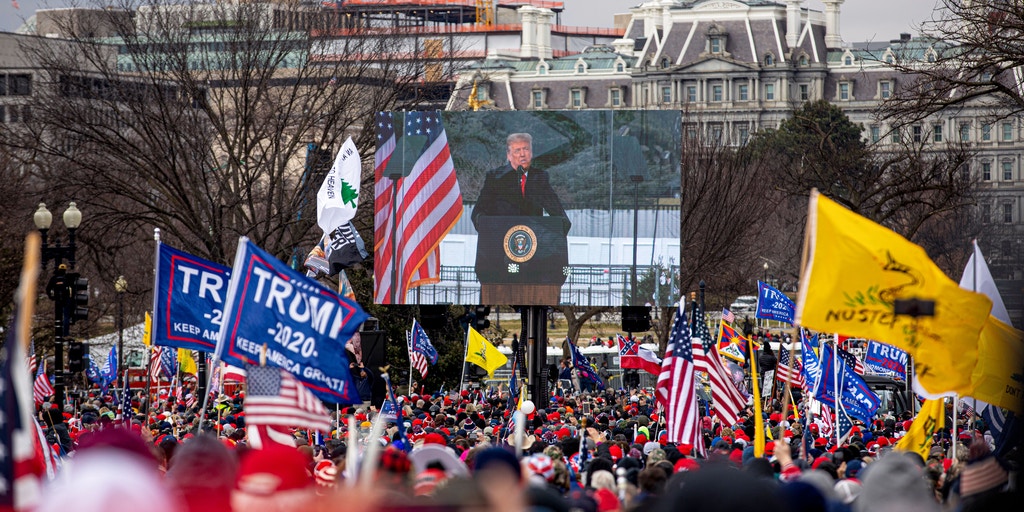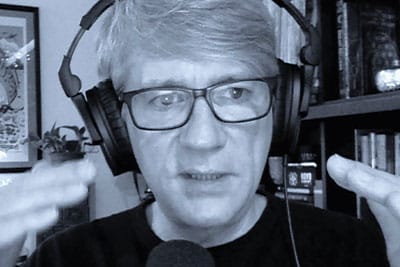The Cameraman Who Knew Too Much

“This is a chilling action,” said journalist Steve Baker. “It’s frightening, to say the least.”
That “action” is Baker’s impending federal prosecution for crimes he allegedly committed while covering the January 2021 riot at the U.S. Capitol. A conviction for just one of those alleged crimes, interstate racketeering, could land him behind bars for five years or more.
Baker, who goes by the moniker “The Pragmatic Constitutionalist” on social media, told The New American the charges against him, especially the one claiming he’s a state-hopping gangster, are “ridiculous.” He believes the feds are trying to “scare the bejesus out of” him because, as he put it in a Thanksgiving Day Facebook post,
I saw things I wasn’t suppose [sic] to see. I wrote words that do not fit the approved narrative of the current presidential administration and their appointees in the Department of Justice. I’ve learned and reported things about the government’s own involvement leading up to the events of January 6th which they do not want me saying or further expounding upon. I’ve drawn conclusions and stated opinions — all protected by the 1st Amendment — that some deem need silenced.
A musician by trade, Baker found himself out of work two years ago when politicians, taking advantage of the COVID-19 pandemic to flex their Mussolinian muscles, declared his job “nonessential.” Rather than rely on government handouts, Baker decided to turn his longtime avocation into his new vocation, earning a living as a journalist covering and analyzing current events.
Covering the Capitol Chaos
Anyone with a nose for news knew that Washington, D.C., was the place to be last January 6, as Congress was meeting to certify the Electoral College vote in a presidential election that appeared to many to be rife with fraud. Thus, Baker dutifully trekked from his home in North Carolina to Washington, video camera in tow, to record the events of the day for posterity.
Baker first attended then-President Donald Trump’s rally. Finding it “kind of a dud,” Baker said he left after “about half of Trump’s speech” and made his way to Capitol Hill. He noticed “tens of thousands of people” also headed in the same direction.
When he arrived at the Capitol, “a few dozen people” were already engaged in violent protests, he recalled. These weren’t just ordinary Trump supporters who had wandered over from the rally. They were, in Baker’s opinion, professional rioters, some perhaps from militias or other “far-right” groups, others from far-left organizations such as Antifa. These people, he said, “came prepared for” violence, wearing body armor, protective goggles, and gas masks and even bringing along medics to treat them should they be injured.
He also noticed people in the crowd who weren’t participating in the violence “but who were very carefully ‘keeping a close watch’ on everything taking place during the proceedings,” he wrote on his blog. Who were they, and why were they there?
In addition, he spied professional photographers, some with press credentials, already on-site and fully armored. How, Baker wondered, did they know to get there so early and to be prepared for violence?
For a long time, the police mostly did the bare minimum to keep the protesters at bay. Eventually, as the professional protesters managed to whip some of the peaceful crowd into a frenzy and tried to climb into the upper level of the building, the police deployed more forceful measures.
Then, “within just the blink of an eye, the battle line stopped, and the entire police force receded,” said Baker. “When that happened, then there was this free flow of humanity” into the building.
Baker said he waited until a multitude had entered the Capitol before going in himself, continuing to film the unfolding events. Inside, he witnessed what “looked like a tourist day,” with Trump supporters milling about, taking in the sights and reveling in the fact that they had gotten into the hallowed halls of Congress. He saw very little property destruction, but he did spot some suspicious groups of people in tactical gear. When asked by police to leave the building, he did so immediately, he claimed. On his way out, he captured video of Ashli Babbitt’s last moments on Earth.
After the riot had concluded, Baker was contacted by WUSA-TV, the D.C. CBS affiliate, which interviewed him and broadcast portions of the video he had recorded. His video was later shown on national outlets.
Uncle Sam Comes Calling
For the next eight-and-a-half months, as the Biden administration’s crackdown on those with even the most tenuous connections to the events of January 6 continued apace, Baker heard nothing from law enforcement.
In mid-September, Baker said, he got “a call from an FBI agent asking me if I would voluntarily come in for an interview.” After his attorney, Matthew Ceradini, hashed out the terms of the interview with the FBI, Baker agreed to submit to it. When he and Ceradini arrived for the interview, however, they learned that it had to be postponed because “there’s apparently a statute in the code of federal regulations which prevents investigative agencies from talking to members of the press without express written permission of the attorney general’s office.”
About a month later, after the FBI got that permission, they interviewed Baker, having given him written assurance that nothing he said could be used against him in legal proceedings as long as he didn’t perjure himself.
“Their questions were largely centered around [what I did on January 6],” Baker recounted. “They were particularly trying to get me to admit that I … willfully entered a restricted federal building.”
Baker said he told them “over and over and over again” that “no, I never pressed so long as the resistance [from the police] was taking place, but there was a moment in time when it was obvious the police were told to stand down, the doors were open, and people began to move in, and it wasn’t until after several hundred people were already in the building that I actually moved into the Capitol building myself.”
According to Baker, the agents told him he was being investigated for “obstruction of an official proceeding” and “knowingly entering or remaining in any restricted building or grounds without lawful authority.” He said they also told him that if the Justice Department decided to charge him, it would be with one or both of those things. And, he claims, they thanked him for not engaging in any violence or property destruction on January 6.
Charge Account
The agents’ alleged gratitude does not appear to have been shared by others in the Justice Department. Just before Thanksgiving, Baker learned he would be charged under two completely different statutes. The first bans “unlawful activities” such as “injuries to property,” “violent entry and disorderly conduct,” and “parades, assemblages, and display of flags” inside the Capitol. The second, which carries a minimum five-year prison sentence, prohibits “interstate … travel or transportation in aid of racketeering enterprises.”
“Mind-boggling” is how Baker described the first charge. “There’s no evidence of that whatsoever,” he said. “I’m in a thousand other people’s video cameras for what my activities were. The only thing I can be seen doing is holding a camera. I never pressed the police lines. I never engaged in anything else. I never did any property damage or violence whatsoever.”
The racketeering charge, meanwhile, is “as ridiculous as it sounds,” said Baker. It “requires conspiracy,” and “I certainly didn’t participate with anybody. The FBI have investigated me. They know that I have no relationships with … anyone that planned this event. They know that I showed up there independently, and they know that I performed the duty of just wielding a camera.”

Fishy expedition: The government is threatening to prosecute Steve Baker for covering the Capitol riot, but he thinks they’re really after his confidential sources and other information suggesting federal complicity in the events of January 6. (Photo credit: Facebook/thepragmaticconstitutionalist)
He’s still not sure of the reasoning behind the charge. Ceradini’s best guess is that “I willfully crossed state lines, entered the building, and performed illegal activities for which I am profiting from the sale of my videos to various news agencies,” Baker explained. Those profits, he asserted, amount to less than $1,500. What’s more, “I didn’t even make an outreach of any kind to any … press agency or video agency whatsoever. They contacted me.”
Trial and Terror
If the feds are aware of all this, why, then, are they threatening Baker with prosecution?
“I believe that the nexus of their interest goes back to some of the things I have written, particularly some of my own personal investigations into various government agencies’ participation … in the days leading up to January 6 as well as on that particular day,” averred Baker.
Besides challenging the prevailing narrative of an “armed insurrection” overwhelming police and breaking into the Capitol to do violence to those who would certify Joe Biden’s electoral victory, Baker also strongly suggested that officials at the highest levels were aware of what was afoot on January 6 and made sure it took place in a way that minimized their personal risk while maximizing their political gain.
“In short,” he wrote, “what transpired on January 6th was the largest PR victory, won by progressives, since the stock market collapse of 1929 and the ensuing Great Depression. What progressives gained in those following years, by way of the establishment of the New Deal and the birth of our existing welfare state, this day similarly gifted them both the ‘moral authority’ and the ‘public outcry’ REQUIRING them to silence opposition voices and finally justify draconian gun control measures.” (Emphasis in original.)
It has been widely reported that the FBI, at the very least, possessed some foreknowledge of the events of January 6. The agency is also known to have had informants among the Capitol crowd.
Baker, however, believes the FBI isn’t the only federal agency involved in the melee. Between the suspicious characters he spotted and conversations he’s had with military and law-enforcement sources, Baker is convinced that both Special Forces and U.S. Marshals were deployed among the crowd, not necessarily to participate in any plot but to ensure that the events officials were allowing to happen didn’t get out of hand. His investigations into such matters are, he thinks, why the feds are gunning for him.
Baker certainly has good reason to believe the government is trying to intimidate him. He claims he offered to give the FBI his “raw videos” from January 6, but that didn’t satisfy the G-men.
“They’re now wanting everything in my devices,” he said, “so I have a feeling that they’re looking for my confidential sources and that they’re wanting to know what I know and scare the bejesus out of me with the interstate racketeering charge to shut me up.”
In an e-mail to The New American, Ceradini declared his client “not guilty on all charges.” Baker’s prosecution, he wrote, is “purely political” and “an attempt to punish and silence free speech by independent journalists so news reporting can only be done ‘legally’ through ‘sanctioned’ news organizations.”
Conviction Collision
The Biden administration may think they’ve selected an easy target in Baker, an independent journalist with a relatively small audience. If so, they’ve got another thing coming.
“Once you rob a man of his livelihood, there’s nothing left but for the perpetrators of that act to ‘reap the whirlwind’ of their victim’s convictions,” Baker wrote on Facebook. “My convictions are strong, and I’m thankful for the founding principles of this country which now afford me the opportunity to fight back. And … fight I will.”
Michael Tennant is a freelance writer and regular contributor to The New American.